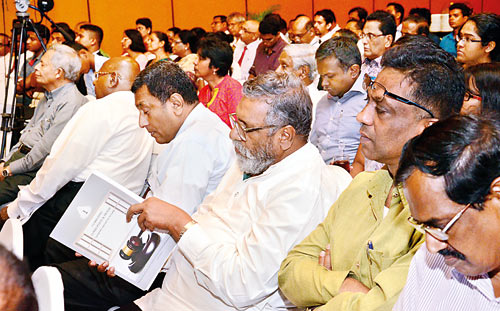Legal pundits want expansion of CIABOC, FCID powers

Section of the audience
A Sri Lankan team of legal experts are planning to make recommendations to the government calling for the expansion of powers of the key institutions looking into bribery and corruption and the police’s new financial crimes division. The Commission to Investigate Allegations of Bribery or Corruption (CIABOC) requires an enhancement of its powers to cover money laundering to ensure they could issue an indictment on a case, Deputy Solicitor General Yasantha Kodagoda said addressing the public forum held on Tuesday in Colombo to discuss “Combating corruption and Fraud: A Pragmatic Approach for Sri Lanka” by the Bar Association of Sri Lanka.
This was carried out with the aim of obtaining the views and discussing issues pertaining to the implementation of the laws on bribery and corruption today in Sri Lanka and its gaps as part of a study funded by the American Bar Association. He said only the three main offences under the Penal Code namely Cheating, Criminal Beach of Trust and Criminal Misappropriation of Property did not cover the entire spectrum of fraudulent activity, he noted. Focusing on the law enforcement agencies and the statutory mandates it was understood that CIABOC’s mandate to investigate and prosecute only bribery and corruption and illegal acquisition of assets did not cover instances of money laundering, which is the whitewashing of the proceeds of crime that arises out of bribery and corruption, Mr. Kodagoda explained.
In this respect, he pointed out that if an individual engages in corruption and financially gains the steps taken to conceal that crime by money laundering is not within the powers of CIABOC. Further people who engage in bribery and corruption engage in forgery of documents and criminal breach of trust, misappropriation and cheating, it was noted. As a result the view that emerged among the legal experts was that CIABOC should have the authority to investigate these matters. Another body that was identified was the Financial Crimes Investigation Division (FCID), which the legal experts pointed out should act in a more independent manner with powers similar to CIABOC to cover Penal Code offences and money laundering, market manipulation and insider trading.
In addition Mr. Kodagoda also explained it was imperative to enhance the flow of cases since the average time of committing a serious offence and the end of a High Court trial is a “staggering 10 years and two months.” In this respect, specialized High Courts need be established in the provinces to hear these cases by not just one judge but with specially trained judges on rotation to hear such cases in a bid to avoid being stereotype and ensure fair trial. Further Mr. Kodagoda during the discussion pointed out that it was necessary to empower the CIABOC with local and foreign investigating agencies. Law and Society Trust Chairman Chandra Jayaratne questioned the availability of adequate laws and regulations to address the issues pertaining to bribery and corruption and the impact of implementing these.
He highlighted that while naming and shaming may work in the villages but with those elected to power this method could help them to get into power. Further, Mr. Jayaratne noted that there is a need to create an environment to hand over the country to the people who are just not charged and also be considered fit and proper. As part of the regulation to declare the assets of public officials, it was found that the police receives about 120,000 which is a roomful of documents, but it was uncertain as to their accuracy, he noted. Questions were also raised on the matters pertaining to whether accountants were reporting on related party transactions and also noted that it was necessary to find the incentives and the dis-incentives that would bring the media to do their professional role.


